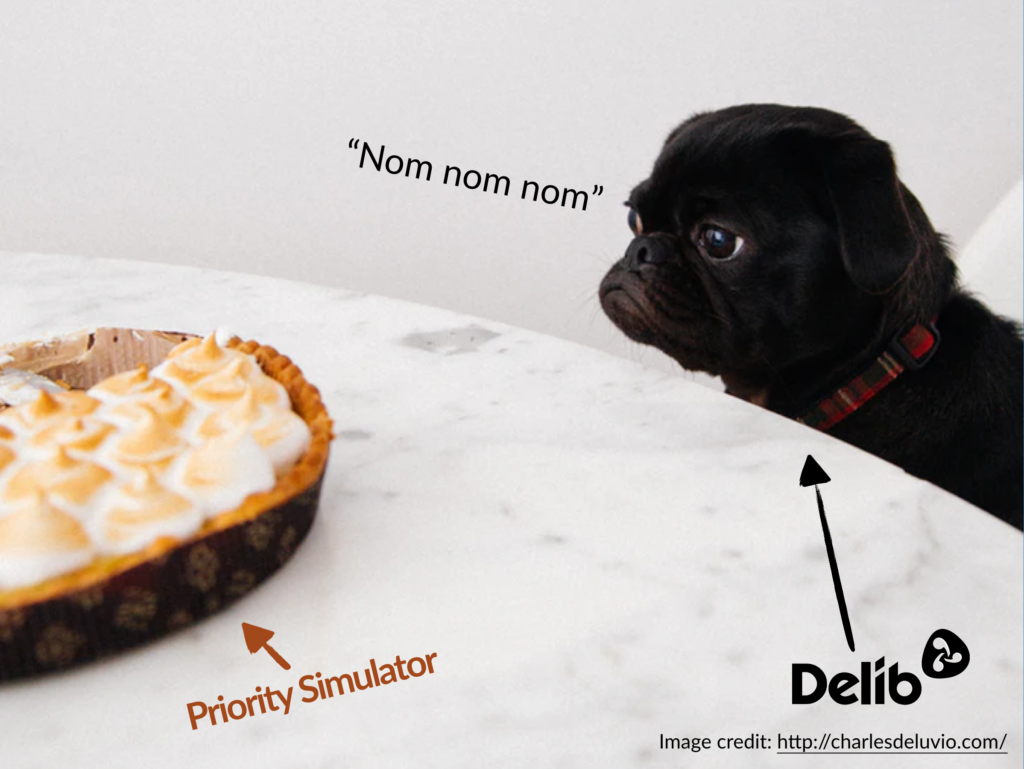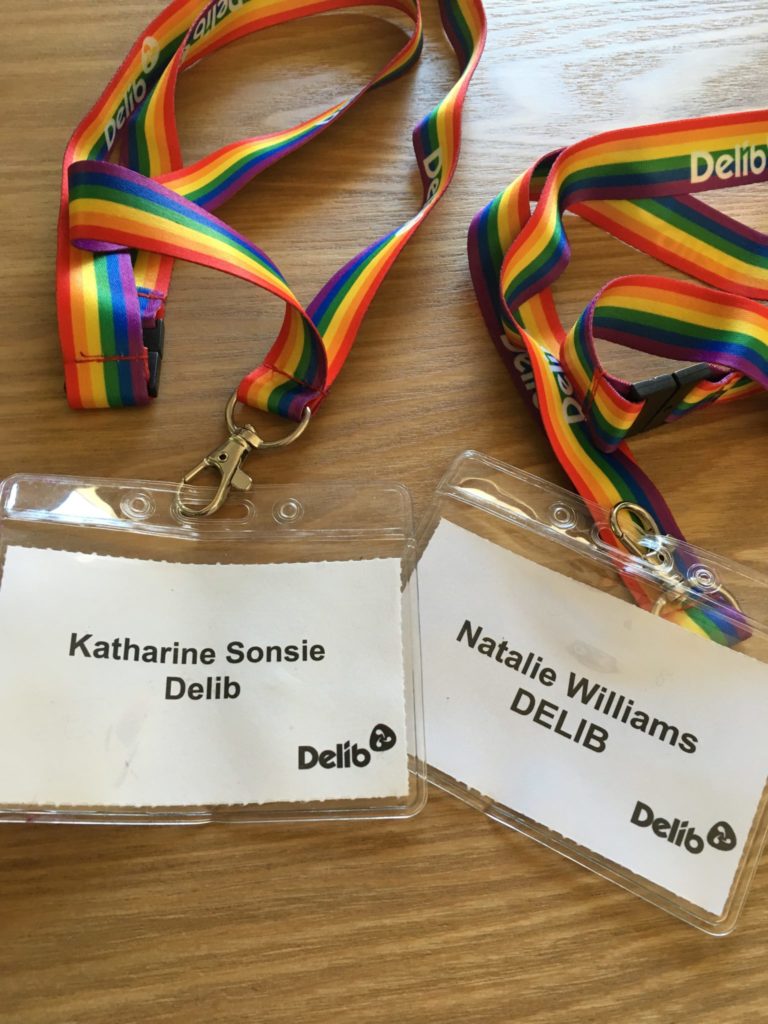Delib holds user groups in different territories and regions throughout the year. These events give customers using our products a valuable opportunity to meet people working in a similar role, and a safe space in which to discuss and troubleshoot challenges – such as stakeholder resistance – and share learnings, such as new processes they’ve implemented which have worked well. We also provide a recap on the latest product news from Delib and respond to questions and product feature suggestions.
For our customers in Australia and New Zealand, account manager Katharine Sonsie has tailored the format of the events to suit their workday schedules and promotes them as “Breakfast with Delib”. They take place first thing in the morning with a short, concise agenda accompanied by a spread of tasty treats, to make it easier and more tempting for busy government folks to make time to attend the event before getting stuck into the rest of their working day. Katharine’s found this format is much better suited to the AU/NZ working culture, where people often start work earlier to give themselves more flexibility later in the day.

Although based in the UK, I was fortunate to attend two of the most recent breakfast events in Perth (in Western Australia, which has its own state government) and Canberra (the seat of the national government). Perhaps unsurprisingly, I found that many of the comments and queries were not so different from the things I hear from customers on the other side of the world. In some ways it’s reassuring to know that government processes for consultation & engagement often follow similar processes or encounter the same challenges, and that there are changes we could make to the products that would benefit users globally.
Perth, Western Australia
Our Perth event was kindly hosted by the team from the Department of Planning, Lands and Heritage of Western Australia at their very modern offices, and attended by Citizen Space users from other government departments and bodies in WA.
After a round of introductions and some challenges involving a pot of loose leaf tea and a lack of straining options (insert stereotypical shock & horror from this Brit etc) I presented a summary of the latest product developments Delib has been working on this year including:
- Our new Kaizen workstream (for small, continuous improvements to Citizen Space) – I outlined each of the four milestones that have happened so far and what we’ve changed. (We weren’t surprised to get a big cheer for the fact that email addresses are no longer case sensitive on the log-in page, hooray!)
- Confirmation that the public side of Citizen Space has been updated to make it compliant with version 2.1 of the Web Content Accessibility Guidelines (WCAG). We talked about what we mean when we use the word “accessibility” and why it’s so important, as well as explaining that the UK Government’s new accessibility guidelines have been one of the key drivers for this piece of work.
- New improved layout options for the Citizen Space homepage – these include the ability to add more images to the homepage for each consultation listed, giving a much more engaging experience for your users – see Transport for London’s new look homepage here.
- Finally, a quick run-down of the latest changes to another of our products, Simulator, including an updated dashboard and the ability to protect the site with an access code. I also shared some of the latest examples of customers who have made use of Priority Simulator, which works similarly to Budget Simulator but respondents are given a budget of points to spend rather than money.

During the break, Katharine & I invited attendees to scribble any questions they had for either us (Delib) or their fellow site admins on post-it notes and stick them up on the wall. After the presentation we held a round table discussion to talk through each question and get people’s views on the topics.
A sample of questions which resulted in some valuable discussion were:
- How do you manage your list of active Citizen Space users?
One organisation described how they’d recently undertaken a big “spring clean” (appropriately, as spring was in full swing while I was in Australia) of all users registered in their Citizen Space site and decided on a policy of suspending anyone who hadn’t used the tool in over a year. We reminded Site Admins that the users export includes a column showing when each user last logged in. We also talked about the prudent approach of suspending users in the first instance, and then subsequently deleting their profiles if you know they no longer require access or you don’t hear from them after a certain period of time.
- How do you incorporate the needs of Aboriginal respondents in your consultations? e.g. images, disclaimers, etc
Though UK government organisations may not have specific indigenous communities to consider as part of their engagement activities, it goes without saying that the UK has more than its fair share of marginalised communities and there is almost certainly crossover in terms of the key considerations and challenges. One organisation told us about some training their team had recently been given by an Aboriginal consultant to increase their understanding of cultural sensitivities and help them to take a more inclusive approach. Designing with indigenous communities in mind is a crucial component of accessibility in Australia and other territories and it’s important to make sure that thought has been given to all of the intersecting audiences of a consultation and their potentially differing needs.
- Question for Delib: Is there any way that we can get a copy of the survey that is editable?
This was a question that several attendees were keen to hear the answer to, and it’s certainly not the first time we’ve been asked! We know it’s a priority request for several customers to be able to convert an online survey into an editable document that can then be printed as a hard copy form or saved as a PDF to send via email. It’s on our long term roadmap for Citizen Space and is something we hope to build into the product when we can.
Our next stop for breakfast was Canberra, home of the Federal Government…
Canberra, ACT
This was a slightly bigger event, since Canberra is home to a more sizable cluster of national government organisations using our products, and was kindly hosted by the team at the federal Department of the Environment and Energy. The best part of hosting a user group is always getting to see customers making connections, cross-pollinating their knowledge and ways of working and even forming friendships, and it was great to see evidence that attendees intended to stay in touch and continue networking beyond the event. This was also a particularly valuable opportunity for some attendees from organisations very new to using Citizen Space, who hopefully went home with lots of ideas after hearing how customers who’ve been using our tools a fair bit longer carry out their work and respond to obstacles.

I delivered the same presentation as at Perth and we ran a similar exercise gathering questions from attendees for their fellow Site Admins and for Delib. Some of those questions included:
- How can you tell colleagues and stakeholders that their survey is too long?
An attendee said that in her view you just have to bite the bullet and tell them, and explain that a survey which takes a painfully long time to fill out is likely to affect respondent rates. For internal surveys, her organisation conducted research and found that a survey taking 10 minutes to complete was still too long and they had to take five minutes at the maximum or people wouldn’t participate. Although she suggested you have a bit more leeway with external surveys as they tend to be on a subject that people are more passionate about, her team have carried this awareness from their internal research through into the design of all their surveys.
- How do you manage surveys with your users?
One organisation gave an overview of their internal quality assurance process, which involves setting up every consultation as a private survey initially – regardless of whether it will ultimately be public or private – to be on the safe side. When it’s ready for review, a preview link is circulated internally to executives before it goes live. They also use this as an opportunity to submit some test data so that the consultation owner can see what the outputs will look like and check that the consultation in its current format is delivering the data they need, and if changes are needed they then clone the consultation and edit it as necessary.
- How do you promote Citizen Space internally?
An organisation that only recently started using Citizen Space has made use of the tool mandatory for colleagues running surveys, with the agreement of their CEO. They’ve advised their users that if they want to ask a small number of people something (e.g. eight people), they should send an email. If they want to ask a few thousand people something, they should use Citizen Space.
We talked around the challenges of getting people to change their habits when they’ve become used to another survey tool, balanced against the advantages of channelling all consultation activity through Citizen Space. Another organisation said that their team’s support (as a central comms & engagement team) is conditional on the person asking for help using Citizen Space; if they’ve decided to use another tool of their own choosing, the centralised team is unable to offer guidance.
- How do you manage support queries from within the organisation?
We were pleased to hear a couple of attendees recommending our online Knowledge Base as an “excellent” and “really useful” resource that allows them to respond to internal queries. Another attendee says that she enjoys answering people’s questions as it helps her to learn things by looking them up, but once she’s located the answer she’ll often include a link to the Knowledge Base in her email to try and encourage them to look up the answer for themselves next time.
- Is there a way stakeholder organisations can preview the survey before they begin their response?
One organisation explained how they will often attach the issues paper containing all of the survey questions to the consultation overview page so that people can refer to the document to prepare their response offline, particularly if it requires the involvement of multiple contributors. This helps to provide a heads-up of where they’ll need to provide comments and where they can upload documents. We also discussed the challenge of encouraging people to submit via the online survey form rather than emailing their response as a document.

Thank you very much to all of the organisations I met during my time in Australia for sharing their insight and learning, and thank you to Katharine Sonsie for organising these events – we hope to meet many more customers at a user group near you soon!
Citizen Space is a citizen engagement platform trusted by government around the world. Government organisations and public bodies use Citizen Space to connect with more citizens, increase engagement and improve processes.
To learn more about what Citizen Space can do for your organisation, book a free demo and we’ll walk you through it.